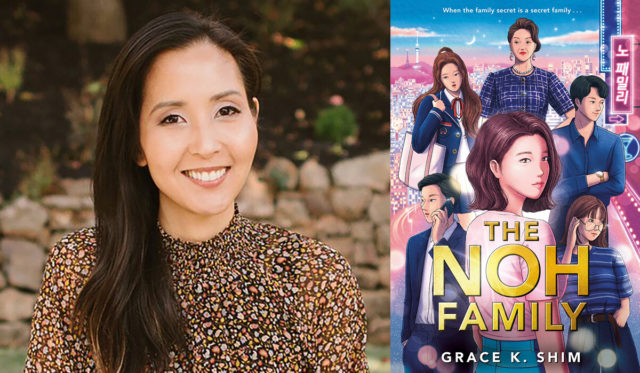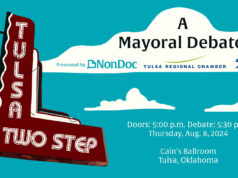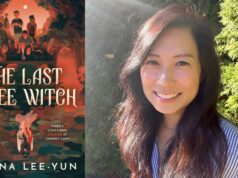
(Editor’s note: NonDoc’s Author Umbrella interviews up-and-coming writers, particularly authors of color, authors of disability and LGBTQ+ authors. The interviews have been transcribed and lightly edited for length and clarity.)
This installment our Author Umbrella series features an interview with Tulsa born-and-bred author Grace K. Shim. When she’s not plotting (the writing kind, not the world domination kind), you can find her wearing a Korean sheet mask, baking French macarons, and unintentionally killing house plants and succulents.
Shim lives in the Bay Area with her husband and three kids, and she recently spoke to NonDoc about her debut novel, The Noh Family, which hit bookstores on May 3.
A quick synopsis of the novel:
When her friends gift her a 23-and-Me test as a gag, high school senior Chloe Chang doesn’t think much of trying it out. She doesn’t believe anything will come of it — she’s an only child, her mother is an orphan, and her father died in Seoul before she was even born, and before her mother moved to Oklahoma. It’s been just Chloe and her mom her whole life. But the DNA test reveals something Chloe never expected—she’s got a whole extended family from her father’s side half a world away, in Korea.
Turns out her father came from one of the richest families in Seoul, and they want to meet Chloe. So, despite her mother’s reservations, Chloe travels to Seoul and is whisked into the lap of luxury … but something feels wrong. Soon Chloe will discover the reason that her mother never told her about her dad’s family, and why the Nohs wanted her in Seoul in the first place. Could joining the Noh family be worse than having no family at all?
In The Noh Family, we follow Chloe Chang, a young aspiring fashion designer, whose story mirrors your real-life experience of discovering relatives through a DNA test. What personal experiences and feelings did you draw upon in shaping Chloe’s emotional arc, and how did they influence your approach to The Noh Family?
The biggest revelation (other than discovering relatives I never knew I had!) was this notion of instant kinship based solely on our genetic connection to each other.
It was strange. One minute, we were virtual strangers, and the next, we were family.
I knew I wanted to explore this further in The Noh Family with Chloe attaching herself right away to people whom she’d just met.
It may seem obvious to others that shared DNA does not necessarily mean family, but, trust me, when you’re discovering relatives for the first time, it’s not quite as clear cut.
THE NOH FAMILY comes out in exactly 2 MONTHS & my family dressed up in cosplay to recreate the cover!!!😭😭Thank you to my family for putting up with me. I love these humans so much💙💖 I’ll have some more fun things to share leading up to pub day—stay tuned. Preorder now! pic.twitter.com/l1H8MOllZj
— Grace K. Shim (@gracemisplaced1) March 3, 2022
Speaking of family, you shared a picture of your family dressed up in cosplay, re-creating The Noh Family cover. It is ADORABLE. What do your kids think of Mom’s debut, and how did your family celebrate The Noh Family’s book birthday?
When I decided I wanted to become a published author, about five years ago, I was very private about my writing journey. Aside from my husband, sister and the small writing group I was part of, I didn’t tell anyone, not even my kids. It was the fear of failing that prevented me from sharing my passion with them, and, in doing so, I realized I missed out on their support and encouragement throughout the years.
It wasn’t until I signed with my agent (four years after I began writing) that I talked more openly about it. My kids, God bless them, are now my biggest fans.
My planned launch was a few days after my release date, but on the actual book birthday, my kids (with the help of my husband) surprised me with a banner, cake and sparkling drink.
As an added bonus, at least once a day, they congratulate me on my book.
The Noh Family has been referred to as Crazy Rich Asians meets The Princess Diaries. But, in addition to being a charming Korean-American YA book rooted in K-drama, it is also very much a story about the complexity of family and all the varying personalities that comprise family. What do you hope resonates with your teenage readers as they navigate their own familial waters?
When I was writing The Noh Family, I was definitely having fun playing off of the many tropes of K-dramas. (Especially since, at the time, I truly felt like I was living in a K-drama myself.)
But at the heart of the story, it’s about a girl trying to find her sense of belonging.
I hope that the story resonates with teens, and not just ones who are K-drama fans, because every teenager has to go through this journey of figuring out where they fit in, whether it’s at school, in a work place or in a family.
And now that I’m a parent, I know how a mom’s protective care can often feel like an obstacle to their child. I hope it gives some perspective to the reader that not all decisions are as easy as choosing between right and wrong.
BRB fostering 7 (yes, SEVEN) kittens. Cuteness overload!!!! 😻😻😻😻😻😻😻 pic.twitter.com/9sBvi2sHRq
— Grace K. Shim (@gracemisplaced1) April 28, 2021
One of my favorite things on your Twitter feed is the pictures and updates of your foster kittens. How many do you currently have, and will any be making an appearance in your future books?
We just got asked to foster a litter of four kittens, but we are going through home renovations, which makes our home an unsuitable environment for them, so we unfortunately had to decline. (Trust me, I’d rather be fostering kittens than going through a home reno!)
We started fostering kittens during the pandemic, which was the perfect amount of commitment for our family, who usually travels quite a bit.
I never thought about adding our foster kittens to my future books, but now I will! They are such fun and each has such a unique personality. I’d love to write cameos of the ones we had a special connection with.
You were born and raised in Tulsa, and you lived in Oklahoma until your sophomore year. You have been candid about your struggle to find a sense of belonging. In what ways have these experiences as a minority in Oklahoma informed your writing, and how do you hope to impact young Korean-American Okie readers who are discovering your stories?
View this post on Instagram
My early manuscripts featured white main characters, and that oddly felt natural to me.
But after long discussions with other writers, I realized that this was a direct result of the lack of diversity not only in my upbringing but also in the literature I read growing up.
Once I realized that’s what was happening, I started writing stories that only featured Korean-American main characters.
As parents to three growing children, I want them to be able to see themselves in books that they read.
On a larger scale, I hope that other Korean-Americans who don’t really feel like they quite fit in with their surroundings, whether or not it’s in Oklahoma or anywhere else in the world, feel some comfort reading my stories.
You are hugely active in the writing community, having participated both as mentee and mentor of Author Mentor Match and Pitch Wars. (I’m currently participating in the program, too, working on a manuscript with the author Brighton Rose as a mentor.) What are the most invaluable writing skills you gained from these programs that you hope to pass on to other aspiring authors?
Revising, hands down. My Pitch Wars mentor, Jesse Q. Sutanto, taught me how to tackle edits, by breaking down the manuscript chapter by chapter, then noting what changes need to happen where.
It helped break down my large revision into smaller chunks and therefore made it seem manageable and not overwhelming.
Something else I’ve gained from the mentorship programs that is not as directly related — but is just as invaluable to my writing skills — is getting plugged into the writing community.
Other writers are not only a support system in an otherwise solitary occupation — you also need trusted critique partners who can share their wealth of knowledgeable and constructive feedback.
Honestly, connecting with other writers has been one of the best things about the journey.
Out of all the interviews you’ve done for The Noh Family, what is a question you wish someone would ask but hasn’t yet?
What a thoughtful question! I am grateful for all the questions about my writing process and about The Noh Family in particular.
I don’t think it’s a question I wish reporters would ask, but it’s more of a discussion I’d love to have one day: I would love to discuss the complexities behind what it’s like as a marginalized author to write about my background. As much as my book really is a K-drama-inspired story, part of me did not want to mislead people to thinking that Koreans are only known for K-pop and K-drama.
I think it’s wonderful to see how the K-drama craze has reached a U.S. audience, not to mention how incredible it is to hear how excited K-drama fans are to read my book. But it does make me wonder about how I’m representing the Korean culture here.
It would be a discussion I would very much enjoy being part of, as I’m sure it’s a concern other marginalized authors are experiencing.





















